As the weather gets warmer, it’s important to ensure your air conditioning system works properly. Regular maintenance can help prevent breakdowns and extend the lifespan of your AC unit. But what exactly is included in professional AC maintenance services?
What’s Included in Professional AC Maintenance Services?
Are you wondering what’s included in professional AC maintenance services? Professional AC maintenance services typically include a thorough inspection of your air conditioning system, cleaning and replacing filters, checking refrigerant levels, inspecting electrical components, and more.
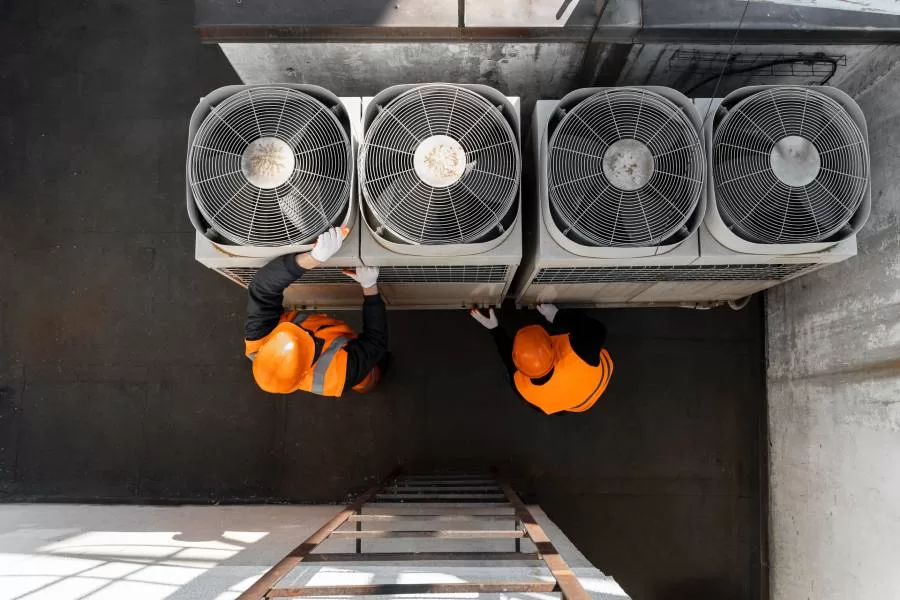
In this blog post, we will dive into the details of what’s included in professional AC maintenance services so you know what to expect from your HVAC technician. By understanding the importance of regular AC maintenance and what the service includes, you can keep your home cool and comfortable all summer.
Table of Contents
Why is AC Maintenance Important?
- AC maintenance ensures the system works efficiently and effectively, saving homeowners money on their energy bills.
- Regular maintenance can prevent breakdowns and extend the AC unit’s lifespan, ultimately saving homeowners money on costly repairs or replacements.
- AC maintenance can also improve indoor air quality by ensuring the system is clean and free of dust, dirt, and other contaminants that can cause respiratory issues.
- Neglecting AC maintenance can create safety risks, including fires and carbon monoxide poisoning, which can endanger homeowners and their families.
What is Professional AC Maintenance?
Professional air conditioning maintenance is essential for keeping your system running at its best. A/C tune-up services include a thorough inspection of the system, professional cleaning of components, and replacement of worn parts.
Regular AC Repair and maintenance can help prevent breakdowns and extend your system’s lifespan.
Annual maintenance is recommended to ensure your air conditioning system runs efficiently and effectively, especially during the hot summer months.
Air conditioning services also include installing new air conditioning systems, repairing existing systems, and maintaining commercial and residential air conditioning systems.
Professional air conditioning services can help you choose the right system for your needs and ensure it is installed and maintained properly. Regular maintenance and repairs can avoid costly breakdowns and ensure your system runs at peak efficiency.
Professional air conditioning services can also advise you on maintaining your system, including tips on keeping your filters clean and adjusting the temperature to maximize energy efficiency.
So, if you want to ensure that your air conditioning system is functioning at its best, it’s important to invest in professional air conditioning services.
What are the Benefits of Professional AC Maintenance Services?
Professional AC maintenance services provide numerous benefits to homeowners and businesses.
Here are some of the key benefits of hiring professionals to maintain your air conditioning system:
1. Improved Efficiency: Regular AC system maintenance can help it operate more efficiently, leading to lower energy bills. Professional technicians can clean and replace dirty filters, check for leaks, and ensure all components are functioning properly, helping your AC system operate at peak performance.
2. Increased Lifespan: Proper maintenance can help extend the lifespan of your AC unit. Regular cleaning and maintenance can prevent wear and tear on your system, helping it last longer.
3. Improved Air Quality: Regular cleaning and maintenance can help improve the air quality in your home or business. Professional technicians can clean and replace filters, remove dust and debris from the system, and ensure that all components are functioning correctly, which can help reduce the amount of dust, allergens, and other pollutants in the air.
4. Fewer Repairs: Regular air conditioner maintenance can help prevent major breakdowns and repairs. Professional technicians can identify and address minor issues before they escalate, helping prevent costly repairs later.
5. Peace of Mind: Hiring a professional air conditioning maintenance service can provide peace of mind, knowing that your system is functioning correctly and efficiently. You can rest assured that your system is being properly maintained and that any issues will be identified and addressed quickly.
Overall, professional maintenance services can provide numerous benefits to homeowners and businesses. By ensuring your system is functioning properly, you can reduce energy costs, extend its lifespan, improve air quality, and prevent costly repairs.
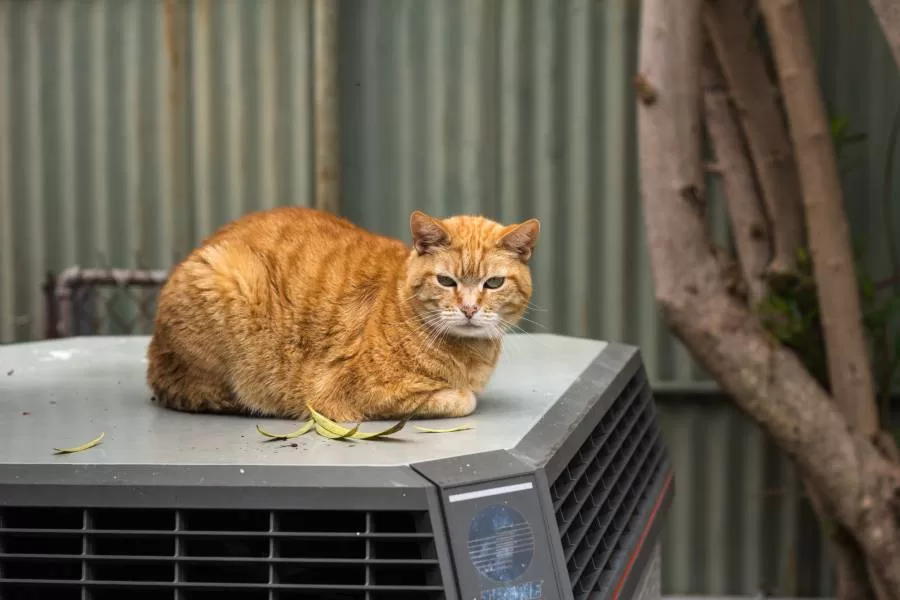
What are the Common Tasks Performed During Professional AC Maintenance?
Regular maintenance is essential to ensure your AC unit operates efficiently and effectively.
Here are some common tasks performed during professional AC maintenance:
1. Cleaning the air filters: The air filters of an AC unit can become clogged with dirt and debris over time, reducing the unit’s efficiency. The filters are cleaned or replaced during maintenance to ensure air flow freely through the system.
2. Checking and cleaning the condenser coils: The condenser coils can accumulate dirt and debris, hindering their ability to absorb heat. A professional AC technician will clean the coils to ensure they function properly.
3. Inspecting the refrigerant levels: The refrigerant is the substance that cools the air in an AC unit. The unit will not cool effectively if the refrigerant levels are too low. During maintenance, the technician will check refrigerant levels and add more as needed.
4. Lubricating moving parts: The moving parts of an AC unit can become worn over time, resulting in increased friction and reduced efficiency. During maintenance, these parts are lubricated to ensure smooth, efficient operation.
What is Involved in Cleaning the AC Unit?
Cleaning the AC unit involves removing debris, dirt, and dust from the condenser fins, coils, and air filters, and checking refrigerant levels to ensure all components are functioning properly. Follow the step-by-step guide:
Step 1: Turn off the power supply to the AC unit. This can be done by turning off the switch on the circuit breaker or the disconnect box located near the outdoor unit.
Step 2: Remove any debris or leaves that may have accumulated on and around the unit. This can be done with a broom or a vacuum cleaner.
Step 3: Remove the outer cover of the AC unit. This can usually be done by unscrewing or unclipping it.
Step 4: Clean the fins of the AC unit using a soft brush or a fin comb. Be careful not to damage the fins, as they are delicate and easily bend.
Step 5: Spray the fins with a hose to remove any dirt and debris that may have accumulated on them.
Step 6: Clean the evaporator coil using a coil cleaner. This can be done by spraying the cleaner onto the coil and letting it sit for a few minutes before rinsing it off with a hose.
Step 7: Clean the air filter of the AC unit. This can be done by removing it from the unit and washing it with soap and water. Alternatively, the filter can be replaced with a new one.
Step 8: Reassemble the AC unit by turning the outer cover back on and the power supply back on.
Step 9: Test the unit to ensure that it is working correctly. This can be done by turning on the AC and checking for cool airflow.
How is Refrigerant Checked and Refilled During AC Maintenance?
During AC maintenance, the refrigerant in the system is checked and refilled as necessary. A technician will first check refrigerant levels using a gauge or meter. If the levels are low, they will locate the AC unit’s refrigerant lines and access valves.
The technician will then connect a refrigerant recovery machine to the system valves to remove any remaining refrigerant. Once the old refrigerant has been removed, the technician will refill the system with the appropriate amount of new refrigerant, ensuring that the correct type and amount are used.
Finally, the technician will check the system for leaks and test its performance to ensure it functions correctly.
How Often Should Maintenance Be Performed for an AC Unit?
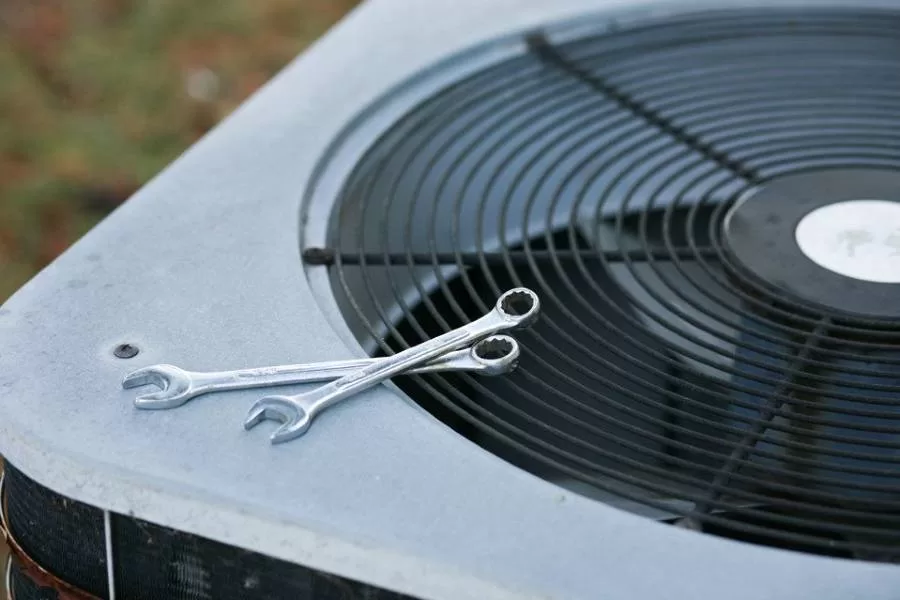
Air conditioning systems are essential to home comfort, especially during the hot summer months. Ensuring the AC unit is well-maintained is important for keeping it functioning optimally.
Most HVAC professionals recommend annual maintenance to ensure the system operates efficiently. This is because the AC unit has multiple components that require regular maintenance to operate efficiently.
Additionally, annual maintenance helps detect potential issues and address them before they become major problems, saving homeowners significant repair costs.
Maintenance requirements for AC units may vary by manufacturer and system type. However, most HVAC professionals recommend preventive maintenance as the best way to keep an AC system in good condition.
Preventive maintenance involves regular cleaning of filters, coils, and other components, and lubricating moving parts.
Additionally, thermostat calibration is an essential aspect of AC maintenance. An improperly calibrated thermostat can cause the AC unit to operate harder than necessary, leading to higher energy bills and premature wear and tear on the system.
Therefore, homeowners should have their AC units serviced annually by a licensed HVAC professional to maintain optimal performance and longevity.
What Factors Determine the Frequency of AC Maintenance?
- The age of the AC unit: Older units typically require more frequent maintenance than newer units, as wear and tear can lead to breakdowns and reduced efficiency.
- Use of the AC unit: Units used frequently, such as in hot climates or during the summer months, may require more frequent maintenance to keep them running smoothly.
- The environment in which the AC unit operates: Units exposed to harsh weather conditions, such as extreme heat or cold, or to high levels of dust or pollution, may require more frequent maintenance to remain properly functioning.
- The type of AC unit: Different types of AC units, such as central air conditioning systems, outdoor units, or window units, may require different levels of maintenance.
- Manufacturer recommendations: Many manufacturers provide maintenance guidelines for specific AC models that should be followed to ensure proper operation and longevity.
- Regular inspections: A professional technician can identify potential issues or areas of concern that may require more frequent maintenance.
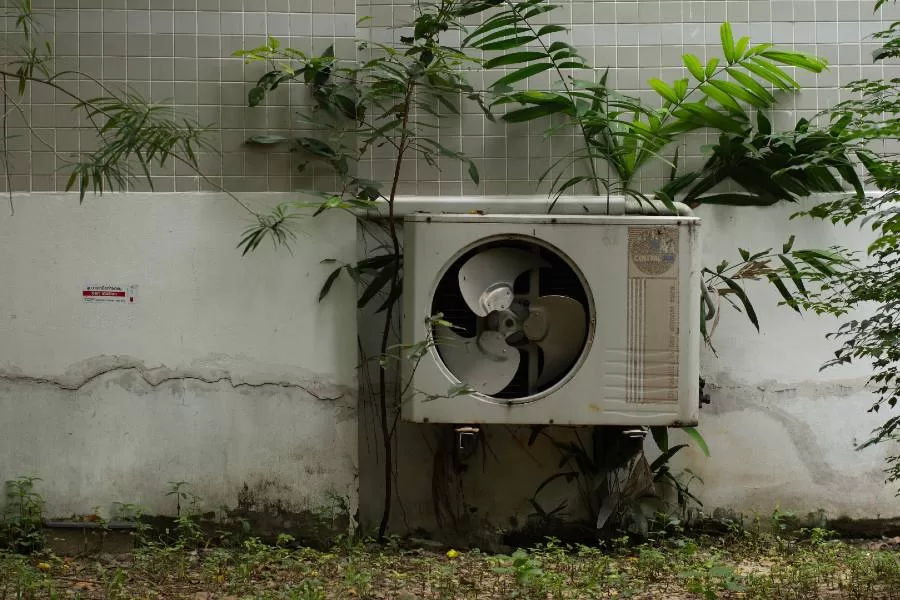
What are the Consequences of Neglecting AC Maintenance?
Neglecting AC maintenance can have serious consequences for homeowners.
First, it can reduce efficiency and increase energy bills. AC units that are not properly maintained may have clogged filters and dirty coils, which can restrict airflow and cause the unit to operate more efficiently. This leads to increased energy consumption and higher utility bills.
Furthermore, neglecting AC maintenance can reduce the unit’s reliability. Over time, components may wear out or become damaged, leading to breakdowns or malfunctions. This can be especially problematic during hot summers when reliable cooling is essential for comfort and health.
In extreme cases, neglecting AC maintenance can lead to costly repairs or premature unit replacement.
Regular maintenance, including professional AC installation, can help prevent these issues by ensuring the unit operates optimally and that potential problems are identified and addressed before they become significant.
What Does an AC Maintenance Technician Do?
An air conditioning maintenance technician ensures that air conditioning systems run efficiently and effectively. Their job involves performing routine maintenance, repairs, and installing air conditioning units in commercial and residential settings.
One of the primary responsibilities of an air conditioning maintenance technician is to perform preventative maintenance on air conditioning units.
This includes:
- Cleaning and replacing filters
- Checking refrigerant levels
- Inspecting electrical components
- Testing system performance
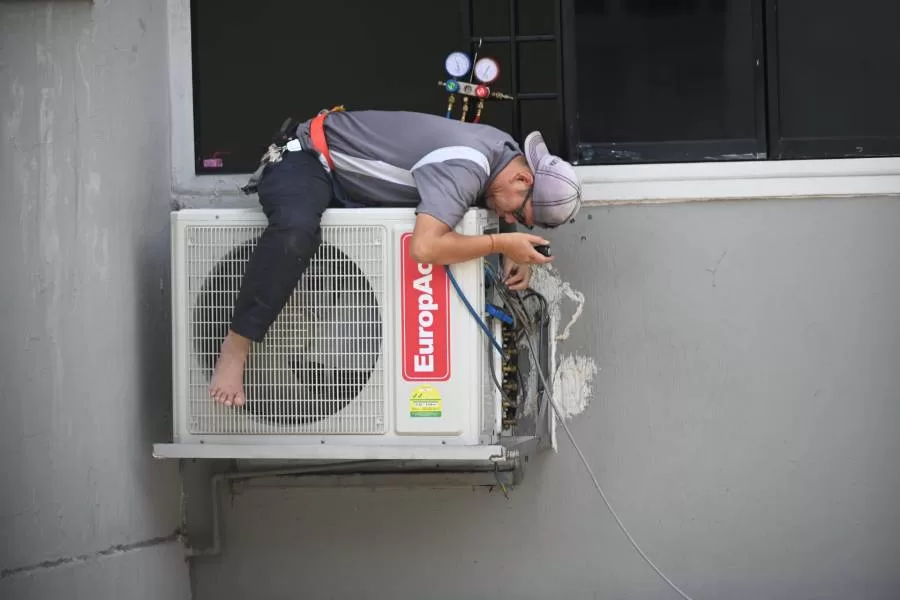
By performing regular maintenance, technicians can identify and resolve potential issues before they become major, costly repairs.
In addition to preventive maintenance, air conditioning maintenance technicians are responsible for repairing air conditioning units when they malfunction.
This involves:
- Diagnosing the problem
- Replacing faulty components
- Testing the system to ensure it works properly
Air conditioning maintenance technicians may also be responsible for installing new air conditioning units in homes and businesses. This involves working with customers to identify their needs, selecting the appropriate unit for the space, and installing it in accordance with manufacturer specifications.
To succeed as an air conditioning maintenance technician, individuals must have a strong understanding of HVAC systems and be skilled at diagnosing and repairing issues. They must also know safety procedures and guidelines when working with electrical components and potentially hazardous refrigerants.
Overall, the role of an air conditioning maintenance technician is critical to ensuring air conditioning systems function correctly and provide comfortable living and working environments.
What Qualifications and Certifications Do AC Maintenance Technicians Have?
AC maintenance technicians maintain, repair, and install air conditioning systems. Specific qualifications and certifications are necessary for this profession.
AC maintenance technicians need a high school diploma or equivalent and HVAC training covering refrigeration, electrical systems, and system design.
AC maintenance technicians typically gain on-the-job experience through apprenticeships or internships with HVAC companies to learn to install, maintain, and repair AC systems.
To be a certified AC maintenance tech, pass an exam from recognized bodies like NATE, RSES, or ACCA.
Getting NATE certified means passing a rigorous exam covering HVAC maintenance areas such as air conditioning, heat pumps, and refrigeration. It’s a nationally recognized certification and the gold standard for AC maintenance technicians.
RSES certification is available for AC maintenance technicians. They must pass an exam covering HVAC maintenance and repair to become certified.
ACCA certification is for AC maintenance technicians. It covers HVAC maintenance and requires passing an exam.
AC maintenance technicians need HVAC training, job experience, and NATE, RSES, or ACCA certification.
What Tools and Equipment are Used During AC Maintenance?
- Refrigerant gauges – used to measure the pressure of the refrigerant in the AC system to ensure it is at the correct level.
- Thermometer – used to measure the temperature of the air coming out of the AC unit to ensure it is within the desired range.
- Vacuum pump – removes moisture and air from the AC system before adding refrigerant.
- Refrigerant recovery machine – used to safely remove refrigerant from the AC system before maintenance or repair work is carried out.
- Screwdrivers and pliers – used to remove and install parts of the AC system during maintenance or repair work.
- Coil cleaner and brushes – used to clean the evaporator and condenser coils of the AC unit to ensure they are free from dirt and debris.
- Air filter – replace the old filter with a new one to ensure the AC unit is circulating clean air.
- Lubricant – used to lubricate the moving parts of the AC system to ensure they operate smoothly and efficiently.
- Electrical multimeter – used to check the electrical connections and voltage in the AC unit to ensure they are functioning correctly.
- Safety equipment and safety devices – gloves, safety glasses, and masks- protect technicians from potential hazards during AC maintenance.
How can Professional AC Maintenance Save Money?
Professional AC maintenance is crucial to maintaining your air conditioning system efficiently and effectively. Regular maintenance can help prevent costly repairs and replacements, saving homeowners money over time. By scheduling routine maintenance with a reputable AC repair service, homeowners can ensure their AC system runs at optimal performance, leading to lower energy bills and a longer lifespan.
A well-maintained AC system will run more efficiently, using less energy to cool a home, resulting in lower energy bills. By investing in professional AC maintenance, homeowners can reduce energy bills and avoid costly repairs or replacements over time.
How Does AC Maintenance Improve Energy Efficiency?
AC maintenance improves energy efficiency by ensuring that the unit runs optimally, with clean filters, well-lubricated parts, and proper refrigerant levels. This reduces the system’s workload, lowering energy consumption and utility bills.
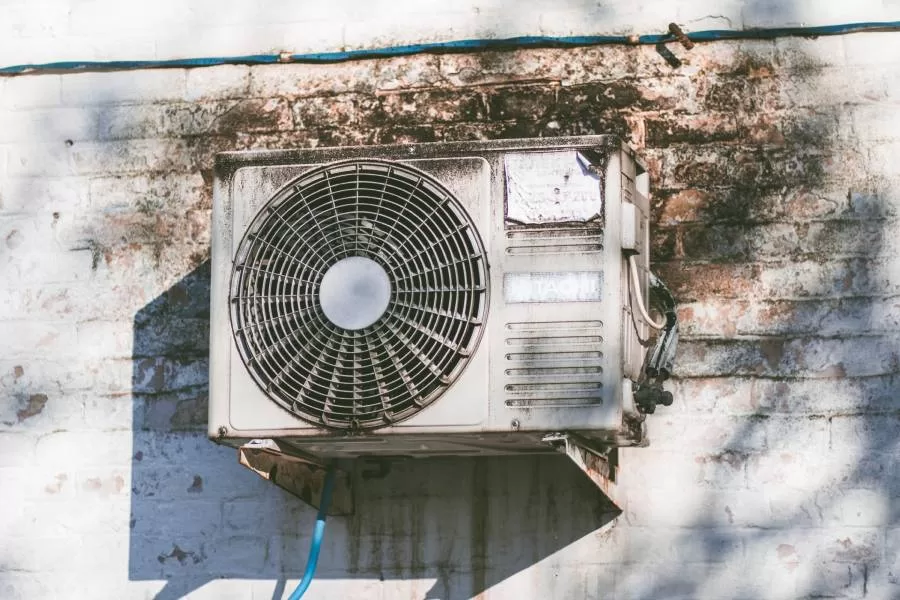
What are the Signs that AC Maintenance is Needed?
Signs that AC maintenance is needed include decreased cooling performance, unusual noises from the unit, foul odors, and a higher-than-normal energy bill.
- Reduced cooling efficiency: If the AC is taking longer to cool the room or is not cooling it as effectively as before, it may indicate maintenance is needed.
- Strange noises: Unusual sounds such as banging, rattling or buzzing may indicate a problem with the AC system.
- Foul odors: If the AC is emitting unpleasant odors, it may be due to mold or bacterial growth within the system, which requires cleaning and disinfection.
- Poor airflow: If the AC is not blowing enough air or the airflow is weak, it may be due to a clogged filter or a ductwork issue.
- High energy bills: If the AC is not functioning efficiently, it may consume more energy, resulting in higher electricity bills.
- Water leaks: If there is water dripping from the AC unit or visible signs of water damage, it may be due to a clogged drain or a refrigerant leak.
- Age of the AC unit: If the AC unit is more than 10 years old, it may require more frequent maintenance to ensure optimal performance and prevent breakdowns.
How can Homeowners Detect Problems with their AC Unit?
- Listen for unusual noises coming from the AC unit, such as grinding or squealing, which could indicate a mechanical issue.
- Monitor the indoor temperature, as a malfunctioning AC unit may struggle to maintain a consistent temperature.
- Check the air filter regularly, as a dirty or clogged filter can cause the AC unit to work harder and less efficiently.
- Look for signs of moisture or leaks around the AC unit, which could indicate a refrigerant or drainage issue.
- Notice any unusual smells, such as a musty or burning odor, which could suggest a problem with the wiring or motor.
- Pay attention to the airflow from the AC unit, as weak or uneven airflow could indicate a blockage or damaged ductwork.
- Consider scheduling regular maintenance check-ups with a professional HVAC technician to catch any potential issues early on.
What is the Cost of Professional AC Maintenance?
The cost of professional AC maintenance varies depending on the type of service required. Basic maintenance services, such as cleaning the filters and coils, can cost anywhere from $50 to $200, while more extensive services, such as repairing or replacing parts, can cost upwards of $500.
Regular maintenance helps prevent costly AC repairs by preventing more serious issues down the line.
Additionally, many professional AC repair companies offer maintenance plans that can provide regular inspections and tune-ups at a discounted rate, making it more affordable to keep your AC running smoothly.
Overall, the cost of professional AC maintenance is a small price to pay compared to the potentially high ac repair costs that can result from neglecting your system.
How Does the Cost of Professional AC Maintenance Compare to DIY Maintenance?
When it comes to maintaining your air conditioning system, you have two options: professional maintenance or DIY maintenance. While both options have pros and cons, cost is one of the biggest factors people consider.
So, how does the cost of professional AC maintenance compare to DIY maintenance?
Professional AC maintenance typically costs more upfront than DIY maintenance. However, it is important to consider the long-term savings of professional maintenance. Professional technicians have the knowledge and expertise to identify and fix small issues before they become major problems, saving you money on costly repairs or even needing a new AC unit.
A well-maintained AC unit will run more efficiently, saving you money on your monthly energy bills.
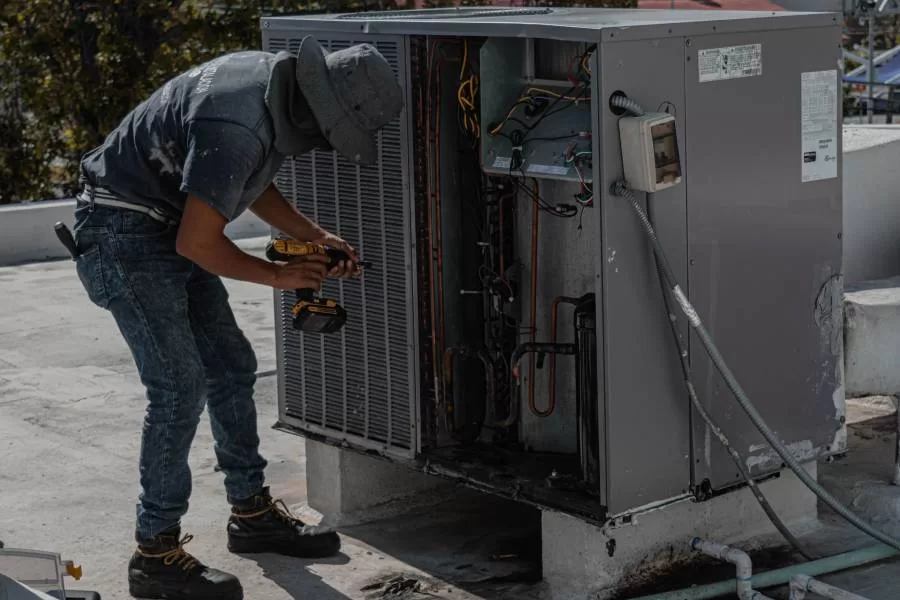
On the other hand, DIY maintenance can be a more affordable option upfront. Some tips for DIY AC maintenance include regularly changing the air filter, cleaning the exterior of the unit, and clearing debris around the unit.
However, DIY maintenance may not catch all potential issues and can sometimes cause more harm than good if done incorrectly.
In order to determine the best option for your situation, consider the age and condition of your AC unit, your budget, and your level of expertise in AC maintenance.
If you choose to go the DIY route, research and follow proper procedures to ensure the safety and effectiveness of your maintenance efforts.
What Are Common AC Installation Mistakes?
Common AC installation mistakes include inaccurate sizing of the unit for the space, improper placement of the outdoor unit leading to airflow obstruction, inadequate insulation of ductwork causing energy loss, incorrect refrigerant levels resulting in decreased efficiency, opting for DIY installation instead of professional assistance, compromising on quality components for cheaper alternatives, and neglecting regular maintenance after installation.
These errors can lead to inefficient cooling, increased energy bills, frequent breakdowns, and premature system failure. It’s crucial to avoid these mistakes by following proper installation practices and seeking professional guidance when needed to ensure optimal performance and longevity of your AC system.
Learn more about Common AC Installation Mistakes and How to Avoid Them.
What Questions Should Homeowners ask their AC Maintenance Technicians?
As a homeowner, ensuring that your air conditioning system is functioning properly and efficiently is important. One way to achieve this is by scheduling regular maintenance appointments with an AC technician.
However, before hiring a technician, it is essential to ask the right questions to ensure they are qualified and capable of providing the best service possible.
Here are some questions homeowners should ask their AC maintenance technicians:
- What is your experience in the HVAC industry?
- Are you licensed and insured?
- What is included in your AC maintenance service?
- What is the recommended frequency for scheduling maintenance appointments for an AC system?
- Can you provide references or customer testimonials?
- What are some common AC problems and how can I prevent them?
- How can I improve the energy efficiency of my AC system?
- What signs should I look for that indicate my AC system needs repair or replacement?
- Do you offer emergency repair services?
- What is the cost of your AC maintenance service, and are there any additional fees or charges I should be aware of?
By asking these questions, homeowners can ensure that they are hiring a qualified and reliable AC maintenance technician who can help them keep their AC system running smoothly and efficiently.
Conclusion
In conclusion, professional AC maintenance services include a wide range of tasks that ensure optimal performance and longevity of air conditioning units. These professional services may include cleaning, lubricating, inspecting, and repairing components such as coils, filters, and fans.
Regular maintenance not only improves the efficiency of the AC unit but also prevents costly breakdowns and extends the system’s lifespan.
Investing in professional AC maintenance services can save homeowners money and keep their homes comfortable throughout the year.
Need help installing, repairing, or maintaining your AC unit? Contact us today and we’ll get started on your AC.


